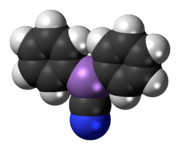Diphenylcyanoarsine
 | |
 | |
| Names | |
|---|---|
| Preferred IUPAC name
Diphenylarsinous cyanide | |
| Systematic IUPAC name
Diphenylarsanecarbonitrile | |
| Other names
Clark 2 Diphenylarsinecarbonitrile | |
| Identifiers | |
| 23525-22-6 | |
| 3D model (Jmol) | Interactive image Interactive image |
| ChemSpider | 58070 |
| ECHA InfoCard | 100.041.545 |
| EC Number | 245-716-6 |
| MeSH | Clark+2 |
| PubChem | 64506 |
| |
| |
| Properties | |
| C13H10AsN | |
| Molar mass | 255.002920742 g mol−1 |
| Except where otherwise noted, data are given for materials in their standard state (at 25 °C [77 °F], 100 kPa). | |
| Infobox references | |
Diphenylcyanoarsine, also called Clark 2 (Chlor-Arsen-Kampfstoff 2, being the successor of Clark 1) by the Germans, was discovered in 1918 by Sturniolo and Bellinzoni[1] and shortly thereafter used like the related Clark 1 gas by the Germans for chemical warfare in the First World War. The substance causes nausea, vomiting and headaches. It can subsequently lead to e.g. pulmonary oedema (fluid on the lungs).
See also
References
- ↑ Sturniolo, G. und Bellinzoni , G. (1919); Boll. chim. pharm., 58, 409–410
This article is issued from Wikipedia - version of the 8/23/2016. The text is available under the Creative Commons Attribution/Share Alike but additional terms may apply for the media files.